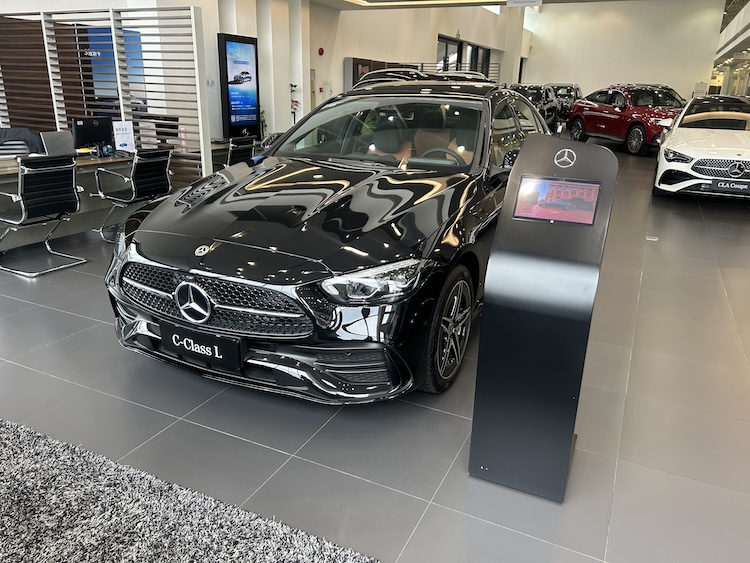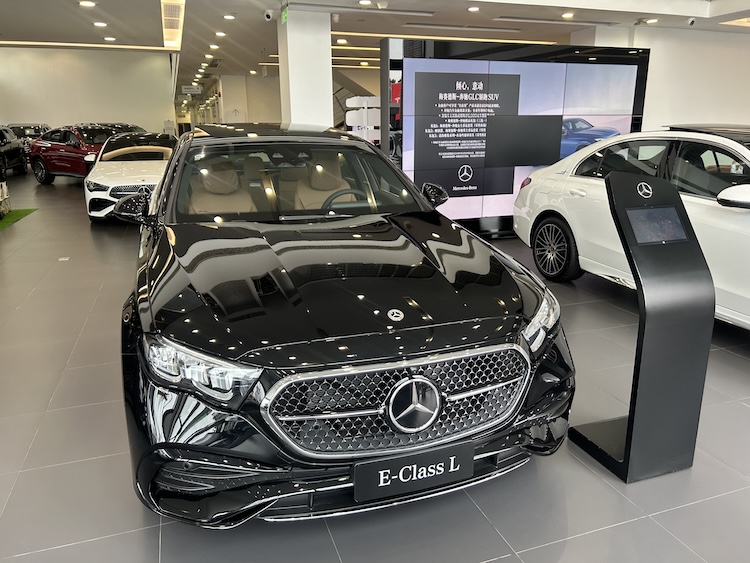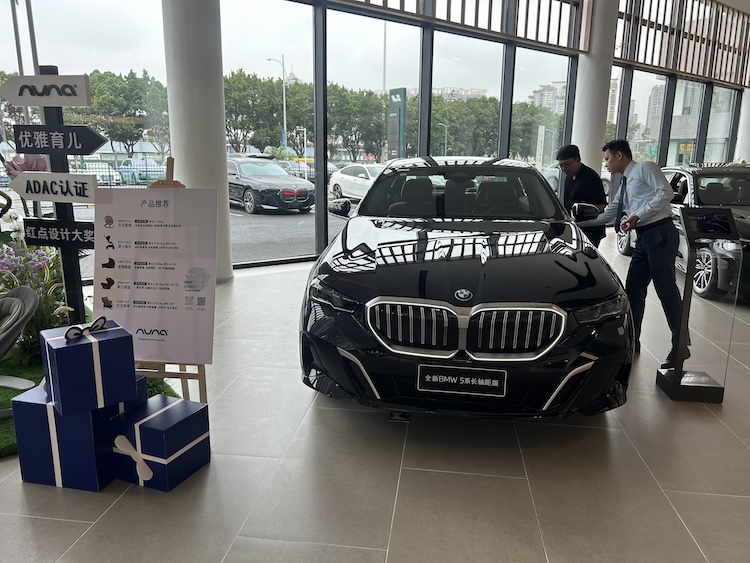Benz reduces its oil-fueled car prices by 100,000 yuan at the terminal, can it still achieve both sales volume and profit?
![]() 09/24 2024
09/24 2024
![]() 514
514

Photo credit: Blue Whale News
On September 23, Blue Whale News (Reporter Li Zhuoling) reported that following the revelation in July that Benz was closely following BMW's exit from the price war, Benz's recent terminal discounts remained high.
On September 23, Blue Whale News visited several Benz dealerships in Guangzhou and learned that the previously more stable oil-fueled cars are currently seeing rising terminal discounts, including popular models such as the A-Class, C-Class, and E-Class, with discounts ranging from 100,000 to 120,000 yuan.
Blue Whale News also learned that the Benz electric vehicle EQ series, which had previously been ridiculed for offering "bone-breaking" discounts at the terminal, is currently unavailable for sale at multiple Guangzhou 4S stores. In response, a 4S store personnel involved in electric vehicle sales stated that currently, only their group in Guangzhou has been exclusively authorized to sell electric vehicles, with discounts of around 140,000 yuan currently available for multiple models.
Will oil-fueled car terminal prices continue to drop?
During Blue Whale News' visits to Benz dealerships in Guangzhou, it was discovered that as the third quarter of the year draws to a close, Benz's popular fuel-efficient models are seeing increased terminal discounts.
Taking the A-Class as an example, one dealership salesperson quoted a price for the top-of-the-line model (with a guide price of 275,700 yuan) currently offering a discount of 122,000 yuan on the bare vehicle. With the addition of taxes, registration fees, insurance, and other costs, the final (mortgage) price is approximately 192,300 yuan.
However, this quote is not the lowest. Several other dealerships offered prices for this top-of-the-line model that are only around 170,000 yuan after all costs, which is 20,000 yuan less than the previous quote, but both require a mortgage plan. Entry-level A-Class models are generally priced around 150,000 yuan after all costs.
'I can only say that the current price is the lowest so far this year. I can't guarantee that it won't drop further, but it won't drop much lower. A Benz car selling for just over 100,000 yuan should be the bottom line,' said one salesperson.

Photo credit: Blue Whale News
In addition to the A-Class, terminal discounts for models such as the C-Class and E-Class also exceed 100,000 yuan. Regarding such intense competition in terminal prices, some dealership personnel stated that this month marks the end of the third quarter and is also close to National Day, so it's a time to boost sales volumes. 'Prices are indeed lower now, making it a good time to buy a car,' they said.
Behind the intensifying competition among oil-fueled cars, Blue Whale News was informed during consultations with multiple Guangzhou 4S stores that they currently have no electric vehicles available for sale.
The aforementioned 4S store personnel involved in electric vehicle sales pointed out that since their group has independent sales authorization for the EQ series of electric vehicles, they currently have other new energy series available for selection, such as hybrid versions of the C-Class and E-Class. In terms of discounts, their EQA and EQB models currently offer discounts of around 140,000 and 150,000 yuan, respectively, and the final price for an EQA can be kept below 200,000 yuan after application.
It may be difficult to achieve both sales volume and profit
Returning to July, the beginning of this quarter, BMW was reported to have 'exited the price war,' and subsequently, Benz, Audi, and other automakers were also reported to have followed suit by increasing prices. However, by the end of September, BMW was reported to have returned to the price war, and Benz's terminal discounts remained high.
Some believe that BMW's return to the price war may be related to recent factors such as a sharp decline in sales, market pressure, the failure of earlier price hikes, and intense market competition. Data shows that in August this year, BMW sold only 34,800 vehicles in the Chinese market, a year-on-year decline of 42%.

Photo credit: Blue Whale News
On the 10th of this month, BMW Group further adjusted its financial guidance for fiscal year 2024, revising downward indicators such as delivery volumes, earnings before interest and taxes (EBIT), and return on capital employed (ROCE). One factor contributing to the decline in performance is the continued sluggish demand in key Asian markets such as China, which has impacted overall sales. According to BMW Group's financial report, the automotive business's profit before tax fell by 14.2% year-on-year to 8.023 billion euros in the first half of this year.
Similarly, Benz, which offers significant discounts at the terminal, also revised its financial guidance for 2024 on September 20, forecasting an adjusted return on sales (ROS) for the full year in the range of 7.5% to 8.5%, lower than the previously projected 10% to 11%. Meanwhile, it expects its EBIT for 2024 to be lower than the previous year. Mercedes-Benz mentioned in its announcement that the adjustment to its full-year financial guidance is related to the impact of declining sales in the Chinese market.
Data shows that in the first half of this year, Benz sold a total of 1.1686 million vehicles globally, a year-on-year decline of 6%. Sales in the passenger car segment totaled 959,700 vehicles, also down 6% year-on-year. Among them, sales in the Chinese market were 341,500 vehicles, a year-on-year decrease of 9%.
It should be noted that the current significant discounts offered by Benz and BMW dealerships are not official price adjustments by the automakers but rather autonomous actions by dealerships. With significant concessions at the terminal, dealerships generally face considerable operational pressure.
According to BMW's statement in July this year, it will reduce store operational pressure by decreasing sales volumes starting from July, aiming to help dealerships cope with short-term market challenges and ease business pressures. Now, behind the return to the price war at the terminal, Blue Whale News also interviewed BMW's factory, but did not receive a response as of press time.
On the Benz side, dealership personnel revealed to Blue Whale News that Benz's production volume has decreased this quarter (Q3). 'Our store used to issue over 300 invoices per month, mainly for vehicles delivered, but now it's around 200. The factory quota has been reduced, and when there's no volume requirement, we have to focus on profit,' they said.
Obviously, for brands and dealerships, balancing sales volume and profit amidst intensifying market competition is both an art and a significant challenge.
It is noteworthy that according to a September 23 statement by the China Automobile Dealers Association, the association has recently submitted an emergency report to relevant government departments regarding the issue of dealership cash flow disruptions caused by the 'price war.'
The report pointed out that currently, automobile dealerships are experiencing widespread losses in new car sales, with prevalent cash flow deficits and increased risks of cash flow disruptions. They are struggling to survive. The two major issues currently facing the industry are: firstly, the dual pressures of sluggish consumption and high factory wholesale volumes have kept dealership inventories at high levels. To reduce financial pressure and financing costs, dealerships are forced to sell vehicles at low prices to survive. Secondly, the 'price war' has led to severe price inversions, with dealerships losing more money the more they sell. At the same time, they face difficulties in fulfilling financing obligations as they expire, leading to disruptions in dealership operating cash flows and a sharp increase in the risk of cash flow disruptions. Currently, the available liquid funds of dealerships have been compressed to their limits.
According to the association's 'Market Pulse' monitoring data, as of August this year, the highest inversion rate between dealership purchase and sales prices has reached -22.8%, a further expansion of 10.7 percentage points from the same period last year. Additionally, according to the association's expert data analysis, in August, the overall discount rate in the new car market was 17.4%. From January to August this year, the 'price war' has resulted in a cumulative loss of 138 billion yuan in the new car market's overall retail sales, significantly impacting the healthy development of the industry.







